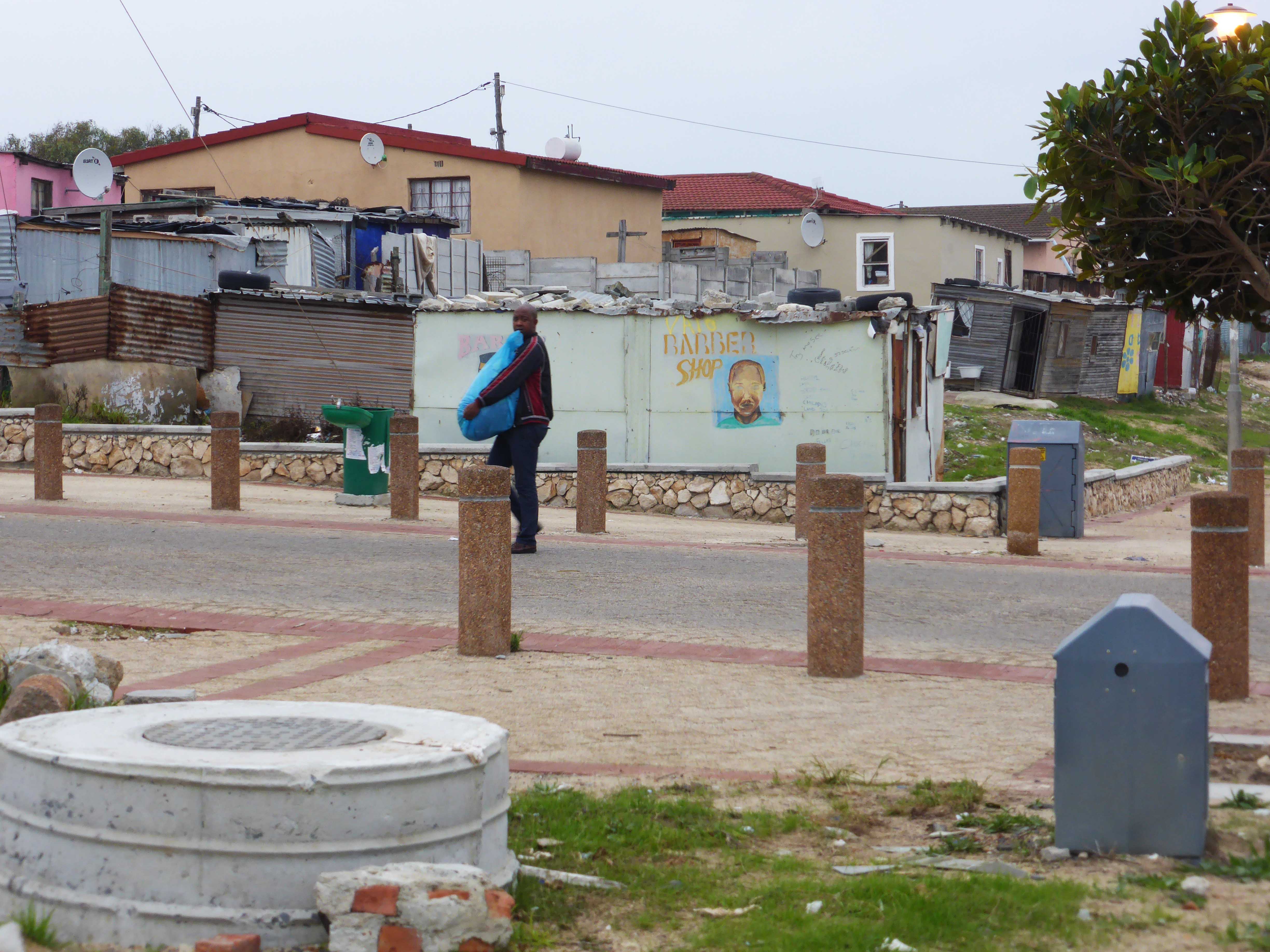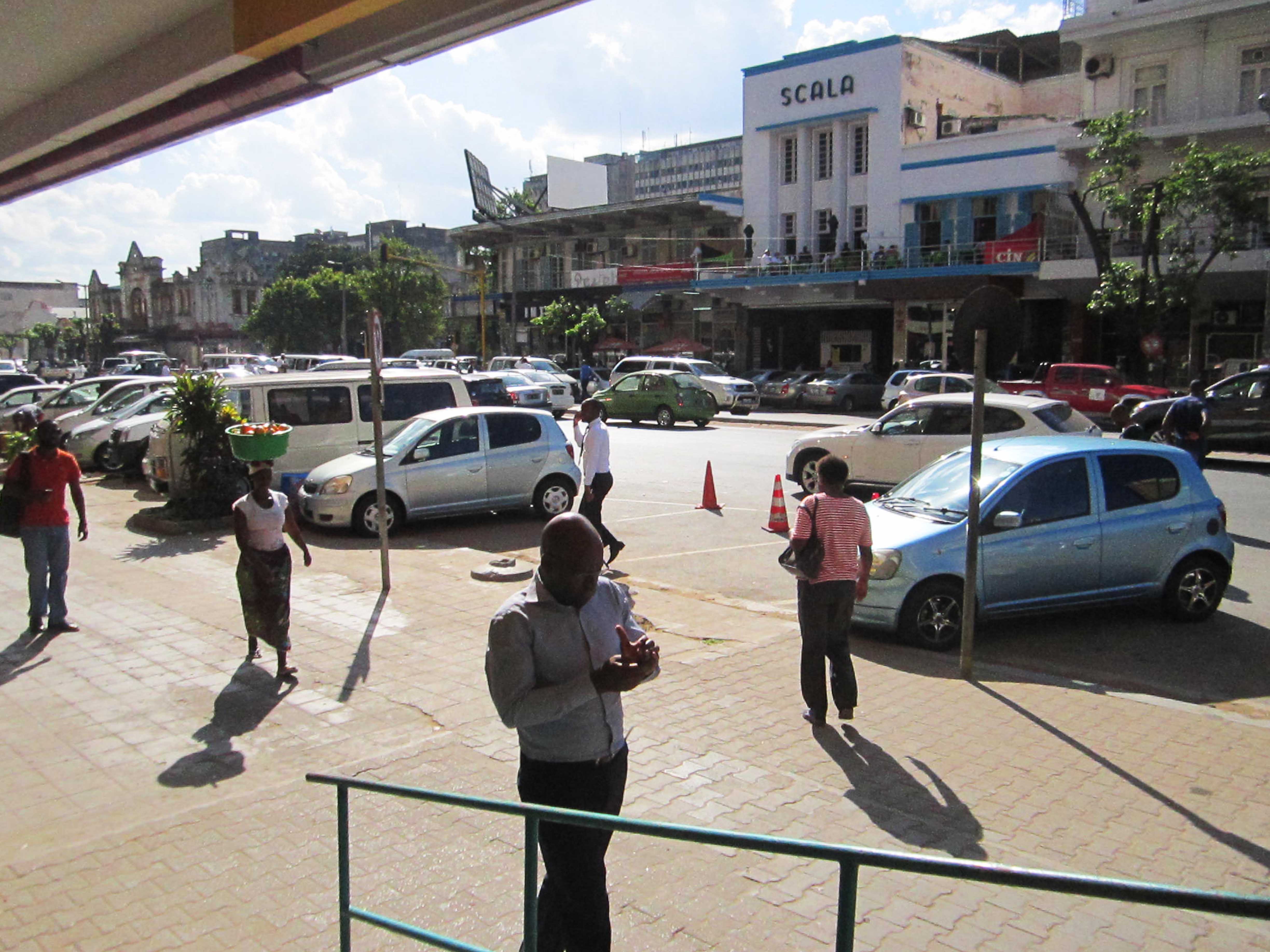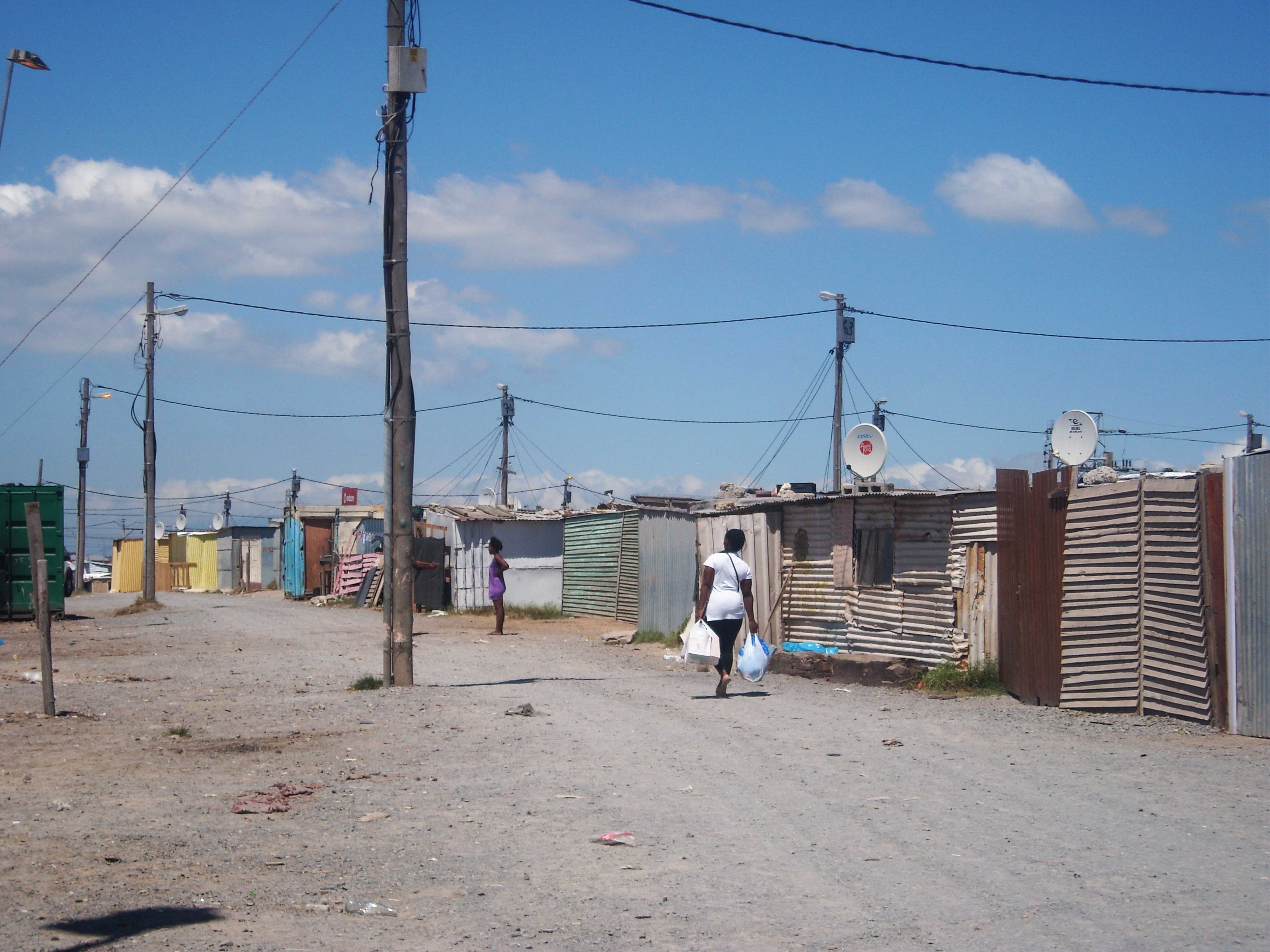DAAD/BMZ, 2016 – 2020
Prof. Dr. Philipp Misselwitz, Dr. Anna Steigemann, Lucas-Andrés Elsner
DAAD Bilateral SDG Graduate Schools: Global Partnerships in Higher Education
The DAAD Bilateral SDG Graduate Schools aim to provide the infrastructure for fostering cooperative efforts among German higher education institutions and their counterparts in Latin America, Africa and Asia. They resonate with the UN 2030 Agenda for Sustainable Development Goals (SDGs). The SDGs are formulated as joint objectives for the world community and cover a broad range of topics and social issues. Their ultimate goal is the generation of well-being and peaceful and inclusive societies while at the same time preserving our planet.
Achieving the SDGs wants to require a series of multidimensional transformations which must be based in systematic knowledge. Therefore, they are not just engaging in fundamental researchand the generation of robust basic knowledge that can contribute to higher ecological, social and economic sustainability. They also train young people who want to be the future decision-makers and practitioners in different sectors (government, business, non-profit etc.) so they can promote the sustainable well-being of their societies.
In the seven DAAD Bilateral SDG Graduate Schools , University of Cooperative Education in Latin America, Asia and Africa, and their Diversity reflects the multifaceted character of the 2030 Agenda. They engage in capacity building through developing and teaching programs related to different SDGs in the natural and social sciences. They also promote academic internationalization and interdisciplinarity : Frequent exchanges among partners (at all stages of development) enable researchers and students to view global challenges from different regional perspectives and modes of knowledge productionand identify interdependencies and cases for comparison between the different world regions. They also put into practice the Agenda 2030 mandate to overcome scientific and political boundaries and approach challenges for sustainable development from to integrated perspective . In order to disseminate their findings, all SDG Graduate Schools have established ties with other epistemic communities and engage with important stakeholders from politics, the economic sector, and civil society. Funding for the DAAD SDG Graduate Schools is provided by the German Federal Ministry for Economic Cooperation and Development, BMZ.
The recently adopted 2030 Agenda for Sustainable Development and the Paris Agreement have highlighted the fundamental roles played by cities and local urban stakeholders in achieving sustainable development. The Habitat III process and the New Urban Agenda (NUA), currently under discussion and expected to be agreed in Quito in October 2016, is a unique opportunity to strengthen the urban narrative globally and provide an enabling framework for cities and local urban stakeholders to achieve SDG goals. By recognising that cities and their inhabitants safeguard global common goods, such as climate, economic prosperity, social integration, democratization and political stability, a profound change in policy responses is needed to enable truly transformative actions, motivating changes in the way we use, build and govern our urban environments.
The bilateral Wits-TUB Urban Lab programme supported by the Federal Ministry for Economic Cooperation and Development (BMZ) and German Academic Exchange Service (DAAD) seeks to improve graduate education in urban fields across sub-Saharan Africa. Both lead partners, the Habitat Unit at the School of Architecture of the Technische Universität Berlin, and the School of Architecture and Planning at University of the Witwatersrand offer a new urban-oriented graduate and postgraduate training and capacity building programme that would effectively address the challenges and needs outlined above.
The overall objective of the programme is to: Contribute to the implementation of urban-relevant SDGs and the New Urban Agenda in sub-Saharan Africa through the development of a sustainable, bilateral academic programme at the University of Witwatersrand (Wits) and TU Berlin (TUB) that will deliver increased capacities at institutional and individual levels in academia, civil society, private and public sectors. The main project activities will include bilateral exchange activities, workshops and conferences implemented through the Wits-TUB Urban Lab and will focus on four innovation areas that address SDG implementation in urban areas:
- Politics and policy of the urban
- Understanding complex urban systems
- Managing change processes
- Co-producing knowledge between theory and practice
The programme offers scholarships to African students with the first scholarships available for the masters studies at Wits University commencing in 2017.
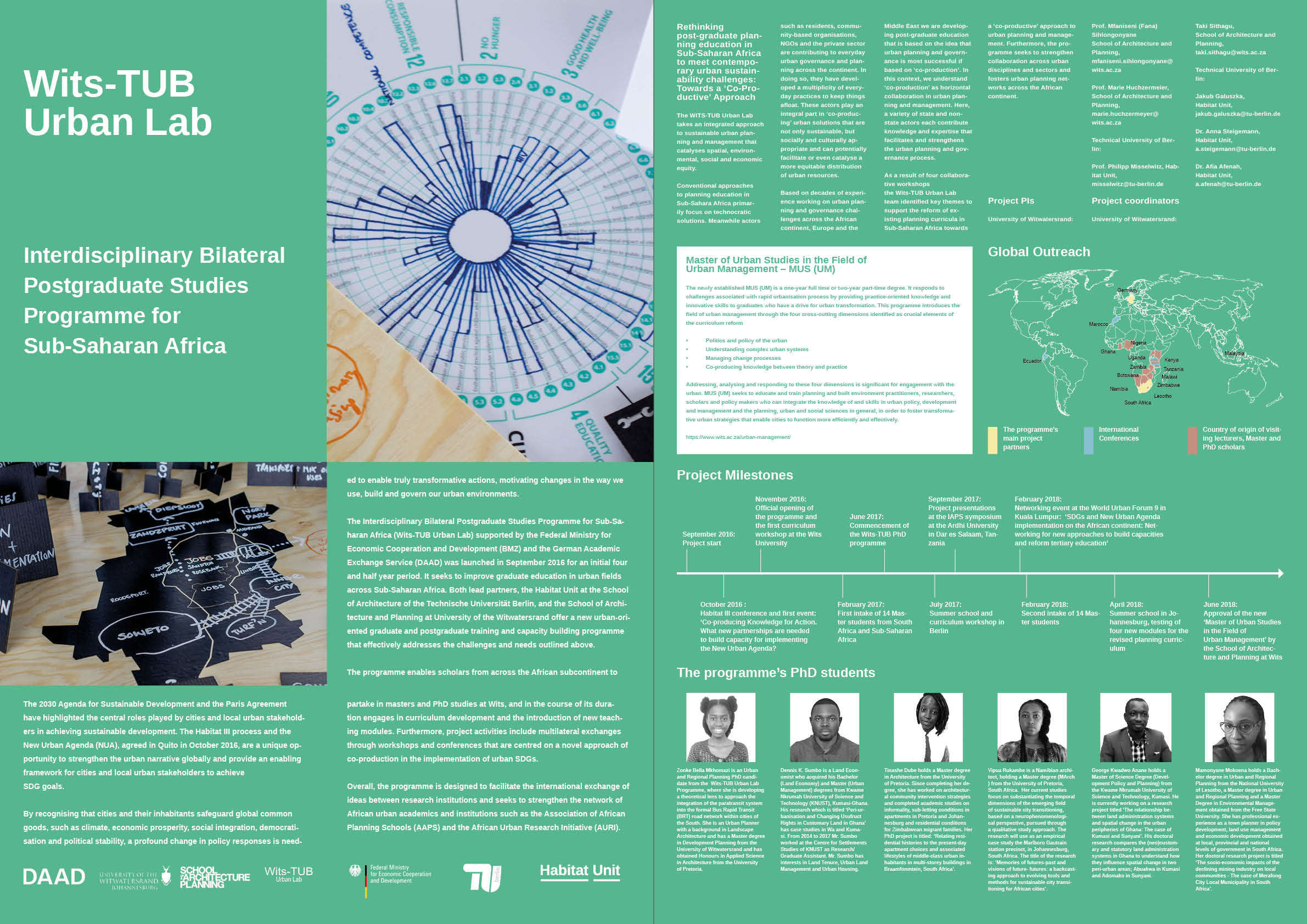


MUS (Urban Management) scholarships for candidates from sub-Saharan Africa
For studies in the School of Architecture and Planning, Wits University, Johannesburg, February to December 2021
(a separate call will be made for ZA citizens and permanent residents)
Apply Here: www.wits.ac.za/archplan/bursariesand-awards/
Deadline Masters Program application: 31 July 2020 (extended deadline)
Deadline Scholarship Application: 31 July 2020
Full Call Download here
Value, period and conditions of the Scholarship
The master's scholarship covers the duration of one academic year.
Successful candidates will be expected to sign a contract stipulating the conditions of the scholarship.
The scholarship includes:
• Full tuition fee
• Monthly stipend (living expenses covering:subsistence expenses and accommodation expenses)
• Travel from home country/place of origin
• Student medical aid (12 months)
• Visa fees and related costs.
Selected students will be required to be self-sufficient from February-April 2021, as their living allowance will be paid in the month of May. They will be responsible for organizing their own travel to Johannesburg, their accomodation
in Johannesburg as well as for applying for their visa and for covering the related costs. Travel and visa costs will be refunded in the first half of the academic year.
Students applying for the scholarship are required to pay for their SAQA fee costs. SAQA fee costs will not be refunded (the SAQA process is explained below).
Eligibility Criteria
Scholarships are open to :
•Citizens from countries in sub-Saharan Africa other than South Africa (a separate call will be issued for South African citizens and permanent residents)
Applicants must possess the requisite qualifications for admission
into the MUS (UM)
Award of the scholarships is based on a combination of merit, distribution across the continent and, gender balance.
There is no age limit applying to the scholarships for study purposes. However, at the time of the application, no more than 6 years should have passed since an applicant graduated from his/her previous studies. All scholarship applicants must have made a complete application for admission to the Master of Urban Studies in the field of Urban Management at Wits University and be in possession of a ‘person number’ which is issued by Wits University
upon application for admission into a degree.
How to apply for the scholarship programme?
This is a separate application in addition to the Degree Programme application.
- Once an application for admission into the degree has been submitted, the candidate can proceed to
complete the bursary application form which is either attached or can be downloaded from
www.wits.ac.za/archplan/bursariesand-awards/
Applications not using this form, or not adhering to its instructions will not be considered.
The ‘person number’ that is issued once you apply for admission to a master’s degree at
Wits University must be included in this form. Forms without the ‘person number’ will not be considered.
Notifications of award of the scholarship will be issued by end of September 2020, after which successful candidates have to immediately proceed with study visa applications. Only scholarship applications of those whose applicationsfor admission into the MUS (UM) was successful will be considered. The closing date for submitting applications for the bursary is 31 July 2020. The closing date for applying intothe MUS (UM) programme is 31 July 2020. The closing date to submit your SAQA certificate is 15 September2020. The Wits-TUB Urban Lab reserves the right not to make all or to make no scholarship awards. Scholarships will be awarded on condition that project funding is approved. Please send the completed application form to the following email address: taki.sithagu@wits.ac.za
For more information please download the full call
Contact:
If more information is needed, please contact: Ms. Taki Sithagutaki.sithagu@wits.ac.za
However, before making an enquiry, please exhaust the information available at:
www.wits.ac.za/archplan/bursaries-and-awards/
www.wits.ac.za/wits-tub-urban-lab/
www.wits.ac.za/urban-management/
www.habitat-unit.de
Between July 17 and July 28 2017, the Habitat Unit hosts the first summer school of the Wits – TUB Urban Lab Interdisciplinary Bilateral Postgraduate Studies Programme (2016-2020).
The summer school focuses on the themes of co-production and practice orientation in research and academia. In this context, the summer school explores three sub-themes central for urban development practice and research. This includes key concepts and different approaches relevant for contemporary housing, urban ecology, social in- and exclusion and urban informality as the three themes with which we research for new innovative ways to co-producing knowledge that also encompasses more practice orientation. The summer school offers the possibility to critically reflect on the origins of such concepts and their applicability across contexts of the global South and North.
The summer school is joined by 14 Master students and 5 PhD students from the School of Architecture and Planning at the University of the Witwatersrand in Johannesburg as well as 23 Master students from the TU Berlin’s international Urban Management Programme. Additionally a number of external scholars from South Africa and Germany take part in the summer school, deliver guest lectures and contribute to the planned discussions and workshop sessions.
In the context of the Wits-TU Berlin Summer School, we also host a public Urban Talk lecture with Prof. Marie Huchzermeyer, who speaks on “Interrogating the New Urban Agenda from the perspective of pressing urban realities in Sub-Saharan Africa” on Monday, July 17, 6.30pm in TUB H3005.
The Summer School is funded by the German Federal Ministry of Economic Cooperation (BMZ) and German Academic Exchange Service (DAAD) via the Bilateral SDG Graduate Schools initiative.
Co-producing urban sustainability transformations: Wits-TUB Urban Lab – Summer School Application deadline for PhD students
3 scholarships will be awarded on a competitive basis to PhD students for joining a summer school at University of the Witwatersrand, Johannesburg, April 16 – 22, 2018, in collaboration with Habitat Unit.
The DAAD/BMZ funded Wits- TUB Urban Lab offers 3 scholarships for PhD students to take part in a summer school on Urban Development in Braamfontein, Johannesburg. The advertised call invites students' contributions, which question whether co-production can serve as a new paradigm to achieve transformation to sustainability in urban areas. How would existing conflictual co-production partnerships need to evolve and what new state-civil society-private sector interfaces might be needed? And what are the roles of urban professionals and researchers in this context?
The submission deadline for scholarship applications is December 30, 2017. During the current selection process 3 PhD students will be selected. Please send your application (including CV and 1 page motivation letter) to: jakub.galuszka@tu-berlin.de (cc: anna.wilkpham@gmail.com).
The scholarships are effective for the time April 16 – 22, 2018 and include flight and accommodation.
3 scholarships will be awarded on a competitive basis to PhD students for joining a summer school between 21-29 March 2020 at the University of the Witwatersrand in Johannesburg
The DAAD/BMZ funded Wits-TUB Urban Lab offers 3 scholarships to PhD students to take part in a summer school on urban development in Braamfontein, Johannesburg. The advertised call invites students' contributions, which question whether co-production can serve as a new paradigm to achieve transformation to sustainability in urban areas. The summer school will investigate: how the existing conflictual co-production partnerships need to evolve and what new state/civil society/private sector interfaces might be needed to advance inclusive urban development practices in sub-Saharan urban contexts? Additionally the summer school will reflect on the roles of urban professionals and researchers in facilitating the aforementioned partnerships and processes.
The submission deadline for scholarship applications is December 23, 2019. During the current selection process 3 PhD students will be selected. Please send your application (including CV and half a page motivation letter) to: jakub.galuszka@tu-berlin.de
The scholarships cover flights and accommodation costs in Johannesburg between 22 and 28 March.
Eligibility: enrolment as a PhD student at the TUB, citizenship of one of countries from ODA recipients country list (appendix 1) or Germany.
Applications from citizens of countries not listed in appendix 1 but with resident status in Germany will be considered on an individual basis after consultation with the DAAD.
Call for summer school scholarships at the University of the Witwatersrand between 21-29 March 2020
18 scholarships will be awarded on a competitive basis to master students for joining a summer school at University of the Witwatersrand in Johannesburg.
The DAAD/BMZ funded Wits-TUB Urban Lab offers 18 scholarships to master students to take part in a summer school on Urban Development in Braamfontein, Johannesburg. The advertised call invites students' contributions, which question whether co-production can serve as a new paradigm to achieve transformation to sustainability in urban areas. How would existing conflictual co-production partnerships need to evolve and what new state/civil society/private sector interfaces might be needed? And what are the roles of urban professionals and researchers in this context?
The submission deadline for scholarship applications is January 15, 2020. During the current selection process 18 master students will be chosen. Please send your application (including CV and half a page motivation letter) to: a.steigemann@tu-berlin.de
The scholarships cover flights and accommodation costs in Johannesburg between 22 and 28 March.
Eligibility: enrolment as a master student at the TUB, citizenship of one of the countries from DAC country list (appendix 1) or Germany. Applications from citizens of countries not listed in appendix 1 but with resident status in Germany may be considered on an individual basis after consultation with the DAAD.
Wits University | January 2019 - December 2019
Background
The 2030 Agenda for Sustainable Development and the Paris Agreement have highlighted the fundamental roles played by cities and local urban stakeholders in achieving sustainable development. The Habitat III process and the New Urban Agenda (NUA), agreed in Quito in October 2016, are a unique opportunity to strengthen the urban narrative globally and provide an enabling framework for cities and local urban stakeholders to achieve SDG goals.
By recognising that cities and their inhabitants safeguard global common goods, such as climate, economic prosperity, social integration, democratization and political stability, a profound change in policy responses is needed to enable truly transformative actions, motivating changes in the way we use, build and govern our urban environments.
The bilateral Wits-TUB Urban Lab programme supported by the Federal Ministry for Economic Cooperation and Development (BMZ) and German Academic Exchange Service (DAAD) seeks to improve graduate education in urban fields across sub-Saharan Africa. Both lead partners, the Habitat Unit at the School of Architecture of the Technische Universität Berlin, and the School of Architecture and Planning at University of the Witwatersrand offer a new urban-oriented graduate and postgraduate training and capacity building programme that would effectively address the challenges and needs outlined above.
Wits-TUB Urban Lab focus
The programme includes bilateral exchange activities, workshops and conferences implemented through the Wits-TUB Urban Lab and will focus on four innovation areas that address SDG implementation in urban areas:
• Politics and policy of the urban
• Understanding complex urban systems
• Managing change processes
• Coproducing knowledge
between theory and practice (Wits-TUB Urban Studio)
The scholarship recipients will benefit from guest lectures, joint supervision scheme and a summer school at Wits University.
Supported Masters programmes
The masters scholarships apply to the following 1 year full time degrees at Wits University in Johannesburg, supported by a bilateral programme with TU Berlin:
• MSc Development Planning (MSc DP)
• Master of Urban Studies in the field of Sustainable Energy Efficient Cities - MUS (SEEC)
• Master of Urban Studies
in the field of Housing and Human Settlements - MUS (HHS)
• Master of Urban Studies in the field of Urban Politics and Governance (MUS - UPG)
• Master of Urban Studies
in the field of Urban Management - MUS (US)
Please note that once completed, the degree certificates are issued by Wits University. They are not joint degrees as such.
Value, period and conditions of the Scholarship
The masters scholarship covers the duration of one academic year. Successful candidates will be expected to sign a contract stipulating the conditions of the scholarship.
The scholarship includes:
• Full tuition fee
• Monthly stipend (living
expenses including: subsistence expences, accommodation, other costs)
• Travel from home country/ place of origin is covered.
• Costs of Summer/Spring School in Berlin
Eligibility Criteria
Scholarships are open to :
• South African citizens
• Citizens from other countries in sub-Saharan Africa
• Applicants must possess the requisite qualifications to be granted the scholarship.
There is no age limit applying to the scholarships for study purposes. However, at the time of the application, no more than 6 years should have passed since an applicant graduated from his/her previous bachelor or master studies. All scholarship applicants must have applied for admission to the relevant degree (as per above list) at Wits University and be in possession of a ‘person number’ which is issued by Wits University upon application for admission into a degree.
How to apply to the Degree Programmes?
Every applicant has to fill in the first basic application form before they can access the full form.
The whole application process (including online access to the application form) is to be find here.
- The University of the Witwatersrand is an English medium university. International students from non-English speaking countries must provide proof of English proficiency. Please refer to the URL above for further information.
- Applications for admission to postgraduate degrees at Wits University for South African and international students for study in 2018 close 30 September 2018. The ‘person number’ provided upon application for admission must be included in the scholarship application form.
- Applicants whose previous degrees were obtained at a university outside South Africa must have their qualifications evaluated by the South African Qualifications Authority (SAQA). This process may happen in parallel to submission of an application for admission. The procedure is set out at www.saqa.org.
- Each degree has a particular requirement regarding admission assignment and/or motivation letter and CV. Please see details for each degree here.
- Once admitted for their degree, international students will apply for a study visa from the South African consulate or embassy in their country. This process must be started as soon as an admission letter is issued.
How to apply for the scholarship programme?
This is a separate application in addition to the Degree Programme application outlined above.
- Once an application for admission into the degree has been submitted, the candidate can proceed to complete
the bursary application form which is either attached or can be downloaded here.
The ‘person number’ that is issued once you apply for admission to a masters degree at Wits University must be included in this form. Forms without the ‘person number’ will not be considered. Applications not using this form, or not adhering to its instructions will not be considered. Only scholarship applications of those whose applications for admission into the degree was successful will be considered.
- The closing date for submitting applications for the bursary is 30 September 2018 (i.e. the same date as the closing date for applications for admission into the degrees). Only candidates whose applications for admission are complete by this date will be considered for the scholarship.
- The University reserves the right not to make not to make all or to make no scholarship awards.
Please send the completed application form to the following email address:
lebo.skhosana@wits.ac.za
The deadline for applications is 30 September 2018.
Application results will be announced in October 2018.
Contact:
If more information is needed, please contact:
Ms Lebo Skhosana
lebo.skhosana@wits.ac.za
Principal Investigators of the programme:
Prof. Fana Sihlongonyane (Wits) Prof. Marie Huchzermeyer (Wits) Prof. Philipp Misselwitz (TUB).
Wits University, Johannesburg | January 2019 - December 2019
Background
The 2030 Agenda for Sustainable Development and the Paris Agreement have highlighted the fundamental roles played by cities and local urban stakeholders in achieving sustainable development. The Habitat III process and the New Urban Agenda (NUA), agreed in Quito in October 2016, are a unique opportunity to strengthen the urban narrative globally and provide an enabling framework for cities and local urban stakeholders to achieve SDG goals.
By recognising that cities and their inhabitants safeguard global common goods, such as climate, economic prosperity, social integration, democratization and political stability, a profound change in policy responses is needed to enable truly transformative actions, motivating changes in the way we use, build and govern our urban environments.
The bilateral Wits-TUB Urban Lab programme supported by the Federal Ministry for Economic Cooperation and Development (BMZ) and German Academic Exchange Service (DAAD) seeks to improve graduate education in urban fields across sub-Saharan Africa. Both lead partners, the Habitat Unit at the School of Architecture of the Technische Universität Berlin, and the School of Architecture and Planning at University of the Witwatersrand offer a new urban-oriented graduate and postgraduate training and capacity building programme that would effectively address the challenges and needs outlined above.
Master of Urban Studies in the field of Urban Management
The masters scholarships apply to the newly set up Master of Urban Studies in the field of Urban Management, a 1 year full time degree at the Wits University in Johannesburg.
The MUS (UM) is set to respond to challenges associated with rapid urbanisation process by providing practice-oriented knowledge and innovative skills to graduates who have a drive for urban transformation. This programme introduces the field of urban management through four crucial and cross-cutting dimensions:
• Politics and policy of the urban
• Understanding complex urban systems
• Managing change processes
• Coproducing knowledge between theory and practice
(Wits-TUB Urban Studio)
Addressing, analysing and responding to these four dimensions is significant for engagement with the urban. MUS (UM) seeks to educate and train planning or built environment practitioners, researchers, scholars and policy makers who can integrate the knowledge of and skills in urban policy, development and management and the planning, urban and social sciences in general, in order to foster transformative urban strategies that enable cities to function more efficiently and effectively. In line with global commitments such as the Sustainable Development Goals (SDGs) and New Urban Agenda as well as other global agendas which tackle developmental and urban challenges in a cross-sectorial manner, this programme stresses the interdisciplinary diagnosis/analysis and prognosis of urban issues across all scales. It provides graduates with an interdisciplinary theoretical, methodological and practical base from which to approach the diverse issues involved in urban development. It promotes an understanding of the complex urban processes and effective interventions that can contribute to the development of well-managed sustainable, inclusive and resilient cities
The programme includes bilateral exchange activities, workshops and conferences implemented through the Wits-TUB Urban Lab including a fully funded Summer/Spring School at the Technical University of Berlin.
Value, period and conditions of the Scholarship
The masters scholarship covers the duration of one academic year. Successful candidates will be expected to sign a contract stipulating the conditions of the scholarship.
The scholarship includes:
• Full tuition fee
• Monthly stipend (living
expenses including: subsistence expences, accommodation, other costs)
• Travel from home country/ place of origin is covered.
• Costs of Summer/Spring School in Berlin
Eligibility Criteria
Scholarships are open to :
• South African citizens
• Citizens from other countries in sub-Saharan Africa
• Applicants must possess the requisite qualifications to be granted the scholarship.
There is no age limit applying to scholarships for study purposes. However, at the time of the application, no more than 6 years should have passed since an applicant graduated from his/her previous bachelor or master studies. All scholarship applicants must have applied for admission to the degree at Wits University and be in possession of a ‘person number’ which is issued by the University upon application for admission to the degree.
How to apply to the Degree Programmes?
Every applicant has to fill in the first basic application form before they can access the full form.
The whole application process (including online access to the application form) is found at:
https://www.wits.ac.za/applications/
- The University of the Witwatersrand is an English medium university. International students from non-English speaking countries must provide proof of English proficiency. Please refer to the URL above for further information.
- Applications for admission to postgraduate degrees at Wits University for South African and international students for study in 2019 close 30 September 2018. The ‘person number’ provided upon application for admission must be included in the scholarship application form.
- Applicants whose previous degrees were obtained at a university outside South Africa must have their qualifications evaluated by the South African Qualifications Authority (SAQA). This process may happen in parallel to submission of an application for admission. The procedure is set out at www.saqa.org.
- The degree has a particular requirement regarding admission assignment and/or motivation letter and CV. Please see details here.
- Once admitted for the degree, international students will apply for a study visa from the South African consulate or embassy in their country. This process must be started as soon as an admission letter is issued.
How to apply for the scholarship programme?
This is a separate application in addition to the Degree Programme application outlined above.
- Once an application for admission into the degree has been submitted, the candidate can proceed to complete
the bursary application form which is either attached or can be downloaded here.
The ‘person number’ that is issued once you apply for admission to a masters degree at Wits University must be included in this form. Forms without the ‘person number’ will not be considered.
Applications not using this form, or not adhering to its instructions will not be considered.
Only scholarship applications of those whose applications for admission into the degree was successful will be considered.
- The closing date for submitting applications for the bursary is 30 September 2018 (i.e. the same date as the closing date for applications for admission into the degrees). Only candidates whose applications for admission are complete by this date will be considered for the scholarship.
- The University reserves the right not to make not to make all or to make no scholarship awards.
Please send the completed application form to the following email address:
lebo.skhosana@wits.ac.za
The deadline for applications is
30 September 2018.
Application results will be announced in October 2018.
Contact:
If more information is needed, please contact:
Ms Lebo Skhosana
lebo.skhosana@wits.ac.za
Principal Investigators of the programme:
Prof. Fana Sihlongonyane (Wits) Prof. Marie Huchzermeyer (Wits) Prof. Philipp Misselwitz (TUB).
Up to 11 master scholarships for candidates from sub-Saharan Africa
For studies in the School of Architecture and Planning, Wits University, Johannesburg, February to December 2020
The masters scholarships apply to the following 1 year full time degrees at Wits University in Johannesburg, supported by a bilateral programme with TU Berlin:
• MSc Development Planning (MSc DP)
• Master of Urban Studies in the field of Sustainable Energy Efficient Cities - MUS (SEEC)
• Master of Urban Studies in the field of Housing and Human Settlements - MUS (HHS)
• Master of Urban Studies in the field of Urban Politics and Governance - MUS (UPG)
• Master of Urban Studies in the field of Urban Management - MUS (UM)
This call is open for applicants who are citizens of sub-Saharan African countries other than South Africa. Up to 7 scholarships out of 11 are earmarked for MUS (Urban Management). A separate call will be issued for scholarships for South African students. For all applicants whose last highest degree was not obtained in South Africa, a proof of application for assessment of their degrees by the South African Qualifications Authority (SAQA) must be attached to the scholarship application (more info under the link below).
The scholarship programme includes a joint TU Berlin-Wits summer school week in Johannesburg in which students from TU Berlin will join the cohort at Wits University.
The scholarship programme focuses on four innovation areas which address SDG implementation in urban areas:
• Politics and policy of the urban
• Understanding complex urban systems
• Managing change processes • Co-producing knowledge between theory and practice.
Value, period and conditions of the Scholarship
The masters scholarship covers the duration of one academic year.
The scholarship includes:
• Full tuition fee
• Monthly stipend (living expenses including: subsistence expences, accommodation, other costs)
• Travel from home country/place of origin
The university reserves the right not to make all or to make no scholarship awards.
How to apply for the scholarship programme?
For instructions on how to apply, please download the full call with detailed instructions, and the application
The University of the Witwatersrand, Johannesburg, School of Architecture and Planning, Professor Mfaniseni Sihlongonyane, Professor Marie Huchzermeyer
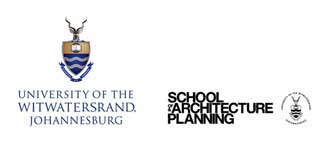
Articles
SDG-Graduiertenkollegs: Gemeinsames Wissen für die Städte von morgen – Bevölkerungswachstum, Luftverschmutzung, verstopfte Straßen – in den Städten in Subsahara-Afrika nehmen die Herausforderungen zu. Ein südafrikanisch-deutsches Graduiertenkolleg fördert nun Nachwuchskräfte, die Städte nachhaltiger gestalten sollen.
Jakub Galuszka
kubagal@gmail.com
Habitat Unit, Room A 622
T + 49 – 30 – 314 – 21908
F + 49 – 30 – 314 – 21907
